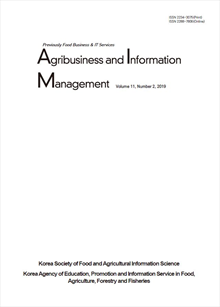간행물
Agribusiness and Information Management

- 발행기관 한국농식품정보과학회
- 자료유형 학술지
- 간기 반년간
- ISSN 2234-3075 (Print)2288-7806 (Online)
- 수록기간 2009 ~ 2021
- 주제분류 농수해양 > 농학 농수해양 분류의 다른 간행물
- 십진분류KDC 522DDC 630
권호리스트/논문검색
Volume2 Number1 (2010년 6월) 7건
1.
2010.06
구독 인증기관 무료, 개인회원 유료
Government Organization and Public Institution have been developed many kinds of agricultural information systems such as agricultural policy, cultivated technology, marketing, and trade so on since 2000. Farm management conditions are diverse and complex more and more. Therefore, farmer want to service the specific agricultural information. Farmer don't like to access many Web sites to retrieve agricultural informations. They hope to receive one-stop its service. Government Organization began to review its information in order to make them more customized agricultural information service. We came up with an effective plan and Service Standardization Code for integrating agricultural technology informations in 2009. We can guide to carry out an effective portal service of agricultural information because we have a good experience about integrating information and system. This paper suggested the service scheme of integrated agricultural information for improving accessibility its information to farmer.
4,200원
2.
2010.06
구독 인증기관 무료, 개인회원 유료
Recently, IPTV population is growing by leaps and bounds. and We performed FGI(Focus Group Interview) with various experts related to agriculture field to establish Agriculture and Fisheries special channel. this growth has social background that is change of paradigm caused by the convergence of broadcasting, demand for Agriculture and Fisheries special channel using new media thanks to interests in Wellbeing, Green food. so we think that we need to consider the way to establish Agriculture and Fisheries special channel and its validity from all angles. that is why we are having a heated discussion with Agriculture and Fisheries marketing experts, farmer, fisher(Korean Cyber Farmer Association), broadcasting experts. Concretely, government budget is needed to establish Agriculture and Fisheries special channel, so we are just about to examine its validity and find business model. to make this discussion detailed, we made 4 subjects. First, Do we need agro-fishery products distribution channel using media? Second, After establishing of Agriculture and Fisheries special channel, how many demands will occur? Third, Should we make Agriculture and Fisheries special channel public channel? Fourth, What would be profit model of Agriculture and Fisheries special channel?
4,800원
3.
2010.06
구독 인증기관 무료, 개인회원 유료
On-line shopping mall has become a powerful marketing tool recently. On-line shopping malls provide information for consumers about goods and influence the decision-making process of purchasers. Therefore many local government made on-line shopping malls for advertising agricultural production in the region. However, in the face of problems related with effectiveness on shopping mall management, most of on-line shopping malls has been managing by private sector actually. This study aims to propose the plans for development of the on-line shopping malls. For this purpose, this study investigated current management status of the shopping malls and conducted case study on-line shopping malls.
9,500원
4.
2010.06
구독 인증기관 무료, 개인회원 유료
Agricultural corporations have been introduced to increase the productivity of farming via entrepreneurial farm management. There are two main subgroups of agricultural corporations. One is composed of farming association corporations and the other consists of agricultural corporation companies. Major tax incentives for agricultural corporations are as follows:
1. Exemption of corporate income tax.
2. Exemption of capital gains tax for farmland investment.
3. Reduction and exemption of dividend income tax for investors.
4,000원
5.
2010.06
구독 인증기관 무료, 개인회원 유료
Discussion in this article will center around introducing RFID/USN technology and exploring feasibility of applying the technology to agricultural area, based on actual pilot project done at the fisheries in Jeju Province, South Korea. The case in this article will suggest some factors needed to consider in applying RFID/USN system to the agricultural business.
4,600원
6.
2010.06
구독 인증기관 무료, 개인회원 유료
In this knowledge based society, the debate on ICT has permanently shifted from ʻwhyʼ ICT for development, to ʻhowʼ comprehensive and holistic ICT policies can unleash human potential and enhance peopleʼs capabilities to improve their lives. Recognizing this untapped potential and development strategies incorporating ICT are being increasingly promoted and launched across the developing countries. While the potential advantages of ICT for development are enormous in developed countries, national policies of developing countries are yet to adequately reflect truly comprehensive and integrated strategies for harnessing and exploiting this potential. This paper presents an analysis of National ICT policy of Bangladesh. Through the examination of ICT policy, in particular in the field of agriculture and rural development and analysis of applied policies and strategies implemented in these area, this paper identifies challenges and opportunities which provides lessons for policy-makers and practitioners involved in the field. This analysis reveals that the policy is inadequate to impact positively on the agriculture and rural development of Bangladesh. The policy places little emphasis on the integration and infusion of ICT in the countryʼs agriculture and rural development. Policy implications and suggestions are offered to ensure maximum use of ICT potentials in the countryʼs agriculture and rural development.
4,300원
7.
2010.06
구독 인증기관 무료, 개인회원 유료
Coordination has been identified as a concern in the cross-cutting issues of food security and nutrition (FSN) in Cambodia. Food Security and Nutrition Information System (FSNIS) in Cambodia is the only “entry portalˮ to support policy formulation and decision-making with regard to FSN. While this knowledge and information management system has earned a respectful reputation, Council for Agricultural and Rural Development (CARD) faces many challenges in the implementation of the system. This paper will present how FSNIS has been developed and impacts on policy or strategy related to FSN. In addition, sustainability of the system is a key challenge for FSNIS; yet it is interesting to see how it works. Along with a success story, FSNIS is recognized by its stakeholders as the most successful knowledge and information management system in the field of FSN in Cambodia.
4,300원

